Free Education and Its Determinants in Europe: A Comprehensive Review
VerifiedAdded on 2022/08/20
|20
|6224
|8
Report
AI Summary
This report provides a detailed literature review on the free education system in Europe, analyzing its determinants and impacts. It begins by introducing the concept of free education and its historical context, tracing its roots from the Islamic Golden Age and Renaissance to its modern-day implementation. The report then examines the factors driving the adoption of free education policies in Europe, including globalization, multiculturalism, immigration, and economic considerations like income tax. It highlights the trend of making education free for both national and international students, and the economic benefits this brings, such as increased tax revenue and enhanced international student enrollment. The report also addresses the literature gap, emphasizing the need for a comprehensive understanding of the various aspects involved in the free education program. A comparative analysis between the USA and UK's educational models is also presented. The report concludes by exploring the potential reasons why other countries might not have embraced similar free education initiatives, providing a well-rounded perspective on the subject.
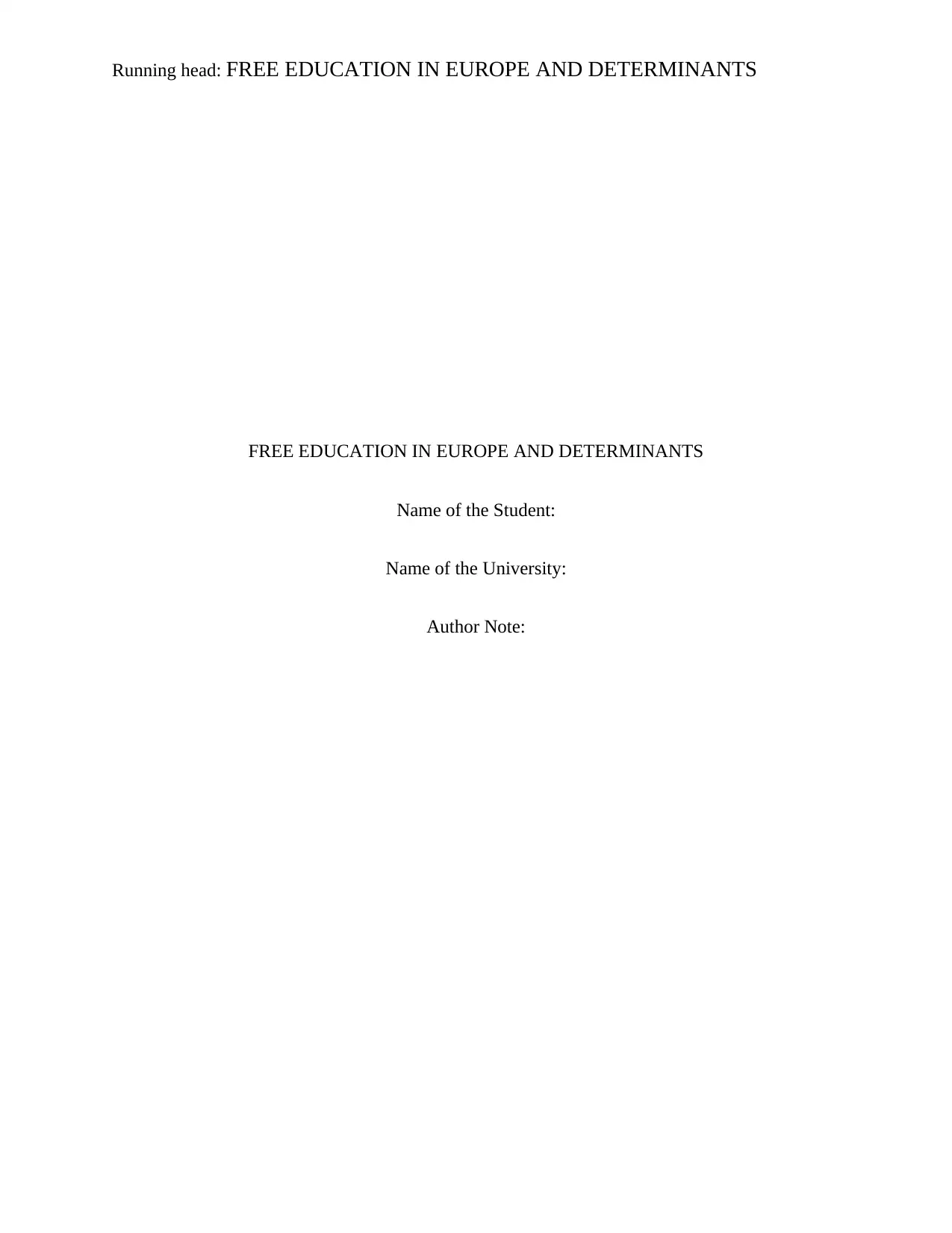
Running head: FREE EDUCATION IN EUROPE AND DETERMINANTS
FREE EDUCATION IN EUROPE AND DETERMINANTS
Name of the Student:
Name of the University:
Author Note:
FREE EDUCATION IN EUROPE AND DETERMINANTS
Name of the Student:
Name of the University:
Author Note:
Paraphrase This Document
Need a fresh take? Get an instant paraphrase of this document with our AI Paraphraser
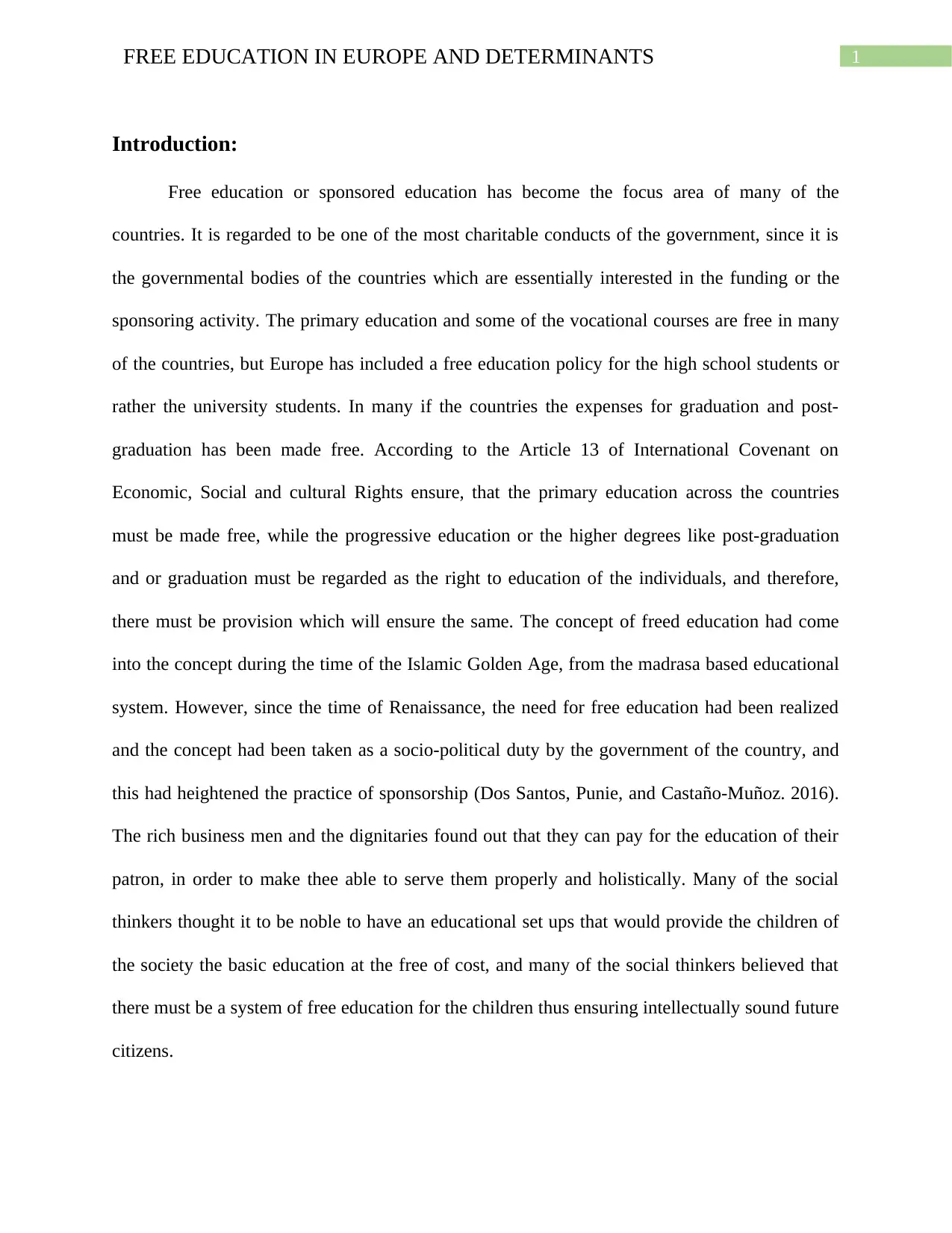
1FREE EDUCATION IN EUROPE AND DETERMINANTS
Introduction:
Free education or sponsored education has become the focus area of many of the
countries. It is regarded to be one of the most charitable conducts of the government, since it is
the governmental bodies of the countries which are essentially interested in the funding or the
sponsoring activity. The primary education and some of the vocational courses are free in many
of the countries, but Europe has included a free education policy for the high school students or
rather the university students. In many if the countries the expenses for graduation and post-
graduation has been made free. According to the Article 13 of International Covenant on
Economic, Social and cultural Rights ensure, that the primary education across the countries
must be made free, while the progressive education or the higher degrees like post-graduation
and or graduation must be regarded as the right to education of the individuals, and therefore,
there must be provision which will ensure the same. The concept of freed education had come
into the concept during the time of the Islamic Golden Age, from the madrasa based educational
system. However, since the time of Renaissance, the need for free education had been realized
and the concept had been taken as a socio-political duty by the government of the country, and
this had heightened the practice of sponsorship (Dos Santos, Punie, and Castaño-Muñoz. 2016).
The rich business men and the dignitaries found out that they can pay for the education of their
patron, in order to make thee able to serve them properly and holistically. Many of the social
thinkers thought it to be noble to have an educational set ups that would provide the children of
the society the basic education at the free of cost, and many of the social thinkers believed that
there must be a system of free education for the children thus ensuring intellectually sound future
citizens.
Introduction:
Free education or sponsored education has become the focus area of many of the
countries. It is regarded to be one of the most charitable conducts of the government, since it is
the governmental bodies of the countries which are essentially interested in the funding or the
sponsoring activity. The primary education and some of the vocational courses are free in many
of the countries, but Europe has included a free education policy for the high school students or
rather the university students. In many if the countries the expenses for graduation and post-
graduation has been made free. According to the Article 13 of International Covenant on
Economic, Social and cultural Rights ensure, that the primary education across the countries
must be made free, while the progressive education or the higher degrees like post-graduation
and or graduation must be regarded as the right to education of the individuals, and therefore,
there must be provision which will ensure the same. The concept of freed education had come
into the concept during the time of the Islamic Golden Age, from the madrasa based educational
system. However, since the time of Renaissance, the need for free education had been realized
and the concept had been taken as a socio-political duty by the government of the country, and
this had heightened the practice of sponsorship (Dos Santos, Punie, and Castaño-Muñoz. 2016).
The rich business men and the dignitaries found out that they can pay for the education of their
patron, in order to make thee able to serve them properly and holistically. Many of the social
thinkers thought it to be noble to have an educational set ups that would provide the children of
the society the basic education at the free of cost, and many of the social thinkers believed that
there must be a system of free education for the children thus ensuring intellectually sound future
citizens.
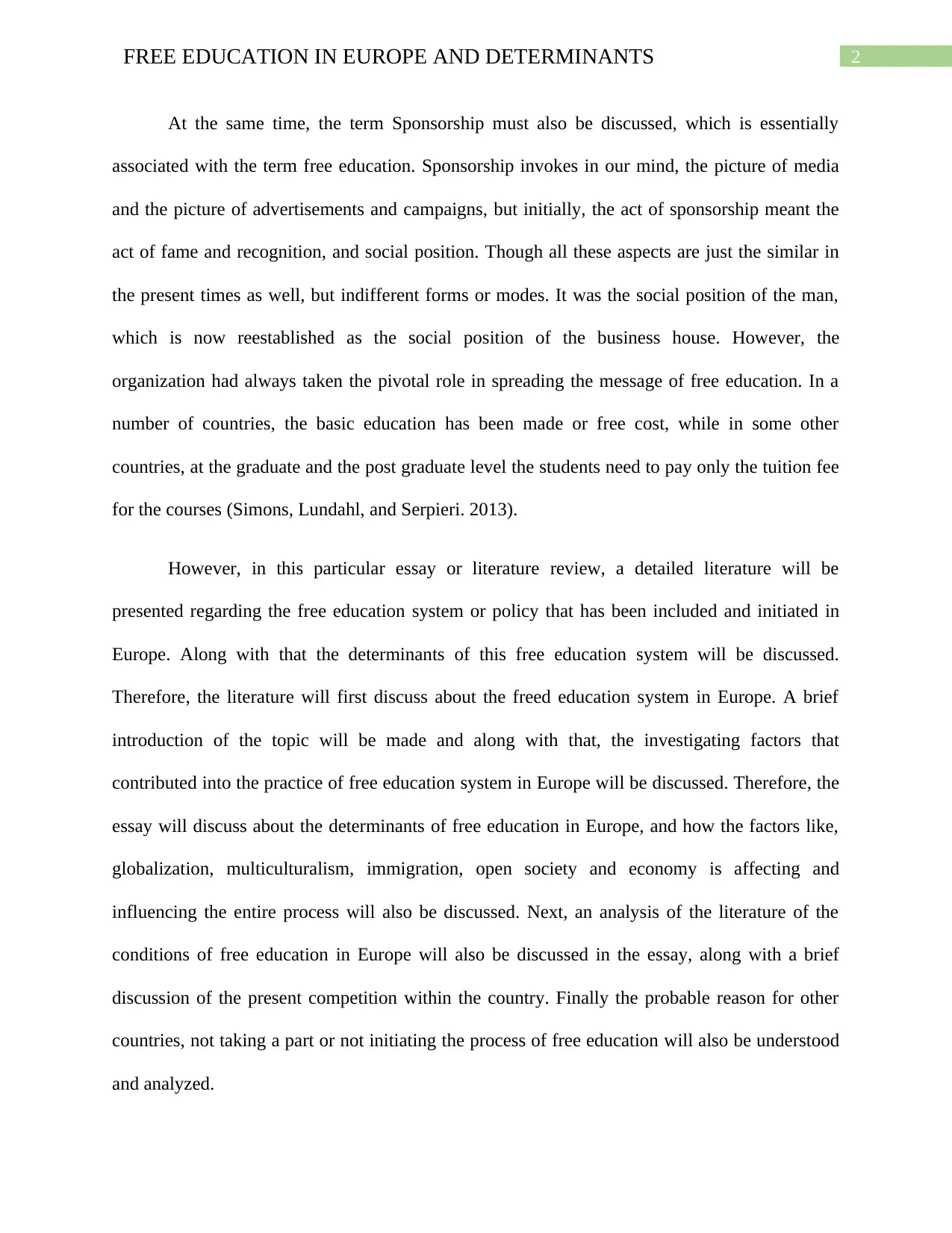
2FREE EDUCATION IN EUROPE AND DETERMINANTS
At the same time, the term Sponsorship must also be discussed, which is essentially
associated with the term free education. Sponsorship invokes in our mind, the picture of media
and the picture of advertisements and campaigns, but initially, the act of sponsorship meant the
act of fame and recognition, and social position. Though all these aspects are just the similar in
the present times as well, but indifferent forms or modes. It was the social position of the man,
which is now reestablished as the social position of the business house. However, the
organization had always taken the pivotal role in spreading the message of free education. In a
number of countries, the basic education has been made or free cost, while in some other
countries, at the graduate and the post graduate level the students need to pay only the tuition fee
for the courses (Simons, Lundahl, and Serpieri. 2013).
However, in this particular essay or literature review, a detailed literature will be
presented regarding the free education system or policy that has been included and initiated in
Europe. Along with that the determinants of this free education system will be discussed.
Therefore, the literature will first discuss about the freed education system in Europe. A brief
introduction of the topic will be made and along with that, the investigating factors that
contributed into the practice of free education system in Europe will be discussed. Therefore, the
essay will discuss about the determinants of free education in Europe, and how the factors like,
globalization, multiculturalism, immigration, open society and economy is affecting and
influencing the entire process will also be discussed. Next, an analysis of the literature of the
conditions of free education in Europe will also be discussed in the essay, along with a brief
discussion of the present competition within the country. Finally the probable reason for other
countries, not taking a part or not initiating the process of free education will also be understood
and analyzed.
At the same time, the term Sponsorship must also be discussed, which is essentially
associated with the term free education. Sponsorship invokes in our mind, the picture of media
and the picture of advertisements and campaigns, but initially, the act of sponsorship meant the
act of fame and recognition, and social position. Though all these aspects are just the similar in
the present times as well, but indifferent forms or modes. It was the social position of the man,
which is now reestablished as the social position of the business house. However, the
organization had always taken the pivotal role in spreading the message of free education. In a
number of countries, the basic education has been made or free cost, while in some other
countries, at the graduate and the post graduate level the students need to pay only the tuition fee
for the courses (Simons, Lundahl, and Serpieri. 2013).
However, in this particular essay or literature review, a detailed literature will be
presented regarding the free education system or policy that has been included and initiated in
Europe. Along with that the determinants of this free education system will be discussed.
Therefore, the literature will first discuss about the freed education system in Europe. A brief
introduction of the topic will be made and along with that, the investigating factors that
contributed into the practice of free education system in Europe will be discussed. Therefore, the
essay will discuss about the determinants of free education in Europe, and how the factors like,
globalization, multiculturalism, immigration, open society and economy is affecting and
influencing the entire process will also be discussed. Next, an analysis of the literature of the
conditions of free education in Europe will also be discussed in the essay, along with a brief
discussion of the present competition within the country. Finally the probable reason for other
countries, not taking a part or not initiating the process of free education will also be understood
and analyzed.
⊘ This is a preview!⊘
Do you want full access?
Subscribe today to unlock all pages.

Trusted by 1+ million students worldwide
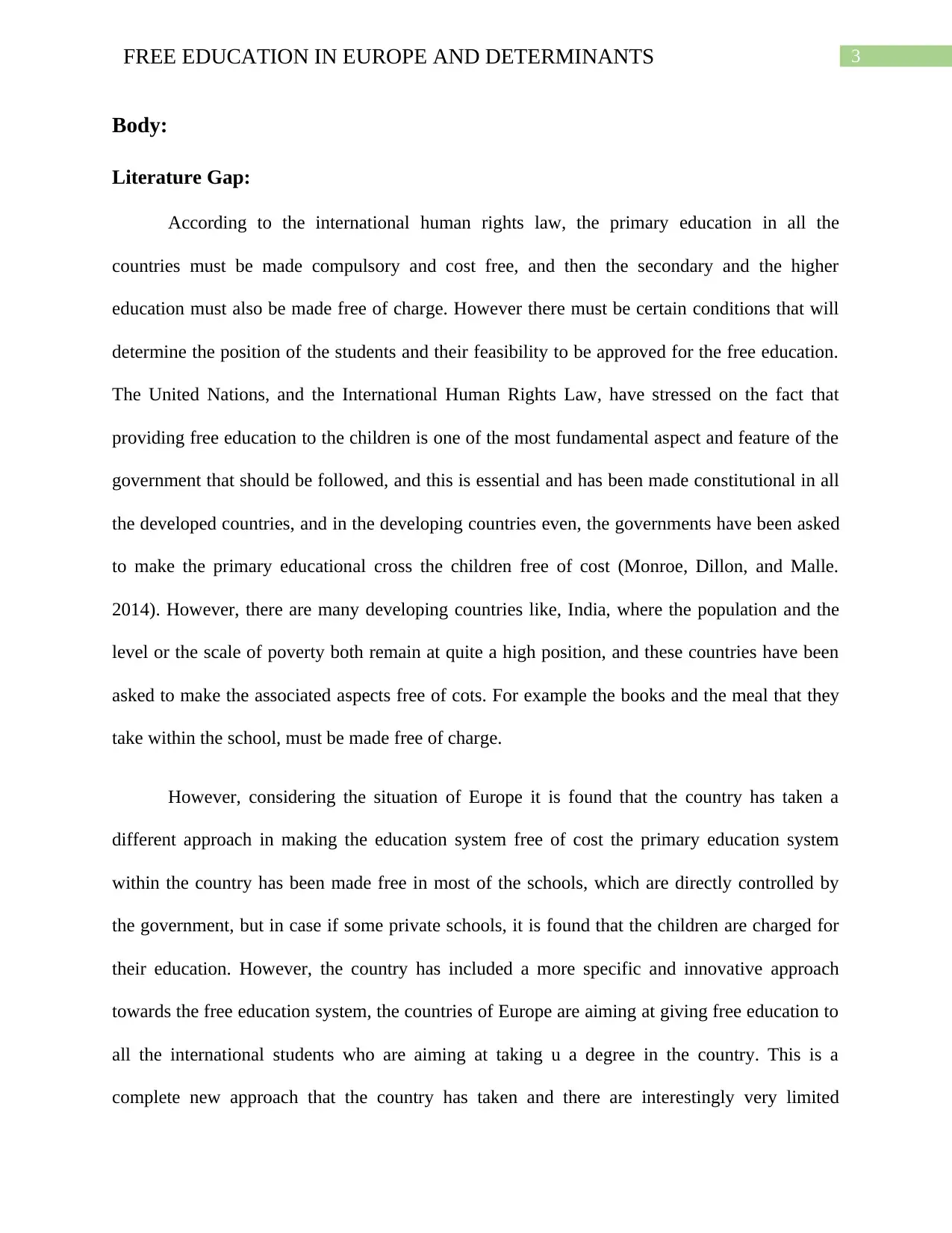
3FREE EDUCATION IN EUROPE AND DETERMINANTS
Body:
Literature Gap:
According to the international human rights law, the primary education in all the
countries must be made compulsory and cost free, and then the secondary and the higher
education must also be made free of charge. However there must be certain conditions that will
determine the position of the students and their feasibility to be approved for the free education.
The United Nations, and the International Human Rights Law, have stressed on the fact that
providing free education to the children is one of the most fundamental aspect and feature of the
government that should be followed, and this is essential and has been made constitutional in all
the developed countries, and in the developing countries even, the governments have been asked
to make the primary educational cross the children free of cost (Monroe, Dillon, and Malle.
2014). However, there are many developing countries like, India, where the population and the
level or the scale of poverty both remain at quite a high position, and these countries have been
asked to make the associated aspects free of cots. For example the books and the meal that they
take within the school, must be made free of charge.
However, considering the situation of Europe it is found that the country has taken a
different approach in making the education system free of cost the primary education system
within the country has been made free in most of the schools, which are directly controlled by
the government, but in case if some private schools, it is found that the children are charged for
their education. However, the country has included a more specific and innovative approach
towards the free education system, the countries of Europe are aiming at giving free education to
all the international students who are aiming at taking u a degree in the country. This is a
complete new approach that the country has taken and there are interestingly very limited
Body:
Literature Gap:
According to the international human rights law, the primary education in all the
countries must be made compulsory and cost free, and then the secondary and the higher
education must also be made free of charge. However there must be certain conditions that will
determine the position of the students and their feasibility to be approved for the free education.
The United Nations, and the International Human Rights Law, have stressed on the fact that
providing free education to the children is one of the most fundamental aspect and feature of the
government that should be followed, and this is essential and has been made constitutional in all
the developed countries, and in the developing countries even, the governments have been asked
to make the primary educational cross the children free of cost (Monroe, Dillon, and Malle.
2014). However, there are many developing countries like, India, where the population and the
level or the scale of poverty both remain at quite a high position, and these countries have been
asked to make the associated aspects free of cots. For example the books and the meal that they
take within the school, must be made free of charge.
However, considering the situation of Europe it is found that the country has taken a
different approach in making the education system free of cost the primary education system
within the country has been made free in most of the schools, which are directly controlled by
the government, but in case if some private schools, it is found that the children are charged for
their education. However, the country has included a more specific and innovative approach
towards the free education system, the countries of Europe are aiming at giving free education to
all the international students who are aiming at taking u a degree in the country. This is a
complete new approach that the country has taken and there are interestingly very limited
Paraphrase This Document
Need a fresh take? Get an instant paraphrase of this document with our AI Paraphraser
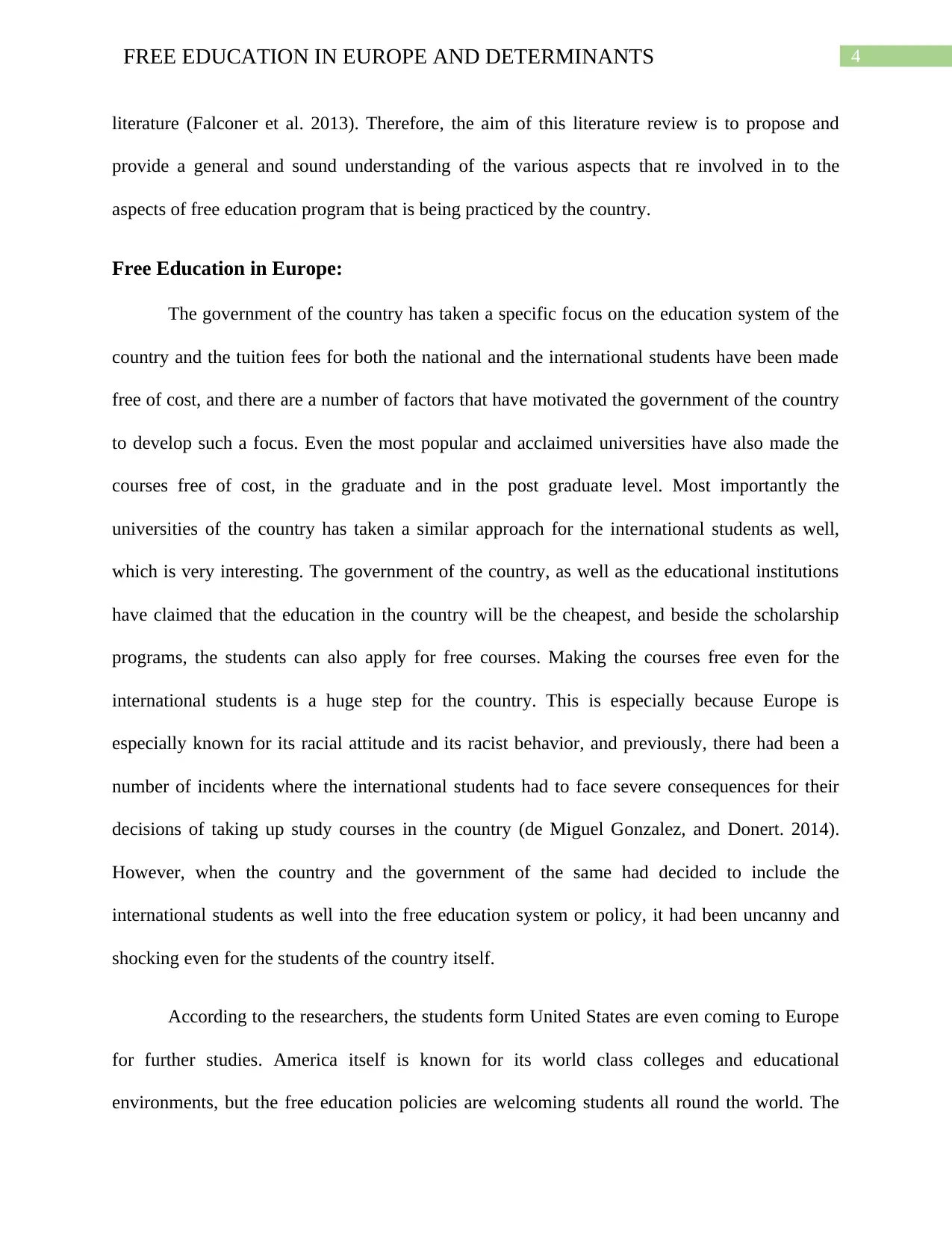
4FREE EDUCATION IN EUROPE AND DETERMINANTS
literature (Falconer et al. 2013). Therefore, the aim of this literature review is to propose and
provide a general and sound understanding of the various aspects that re involved in to the
aspects of free education program that is being practiced by the country.
Free Education in Europe:
The government of the country has taken a specific focus on the education system of the
country and the tuition fees for both the national and the international students have been made
free of cost, and there are a number of factors that have motivated the government of the country
to develop such a focus. Even the most popular and acclaimed universities have also made the
courses free of cost, in the graduate and in the post graduate level. Most importantly the
universities of the country has taken a similar approach for the international students as well,
which is very interesting. The government of the country, as well as the educational institutions
have claimed that the education in the country will be the cheapest, and beside the scholarship
programs, the students can also apply for free courses. Making the courses free even for the
international students is a huge step for the country. This is especially because Europe is
especially known for its racial attitude and its racist behavior, and previously, there had been a
number of incidents where the international students had to face severe consequences for their
decisions of taking up study courses in the country (de Miguel Gonzalez, and Donert. 2014).
However, when the country and the government of the same had decided to include the
international students as well into the free education system or policy, it had been uncanny and
shocking even for the students of the country itself.
According to the researchers, the students form United States are even coming to Europe
for further studies. America itself is known for its world class colleges and educational
environments, but the free education policies are welcoming students all round the world. The
literature (Falconer et al. 2013). Therefore, the aim of this literature review is to propose and
provide a general and sound understanding of the various aspects that re involved in to the
aspects of free education program that is being practiced by the country.
Free Education in Europe:
The government of the country has taken a specific focus on the education system of the
country and the tuition fees for both the national and the international students have been made
free of cost, and there are a number of factors that have motivated the government of the country
to develop such a focus. Even the most popular and acclaimed universities have also made the
courses free of cost, in the graduate and in the post graduate level. Most importantly the
universities of the country has taken a similar approach for the international students as well,
which is very interesting. The government of the country, as well as the educational institutions
have claimed that the education in the country will be the cheapest, and beside the scholarship
programs, the students can also apply for free courses. Making the courses free even for the
international students is a huge step for the country. This is especially because Europe is
especially known for its racial attitude and its racist behavior, and previously, there had been a
number of incidents where the international students had to face severe consequences for their
decisions of taking up study courses in the country (de Miguel Gonzalez, and Donert. 2014).
However, when the country and the government of the same had decided to include the
international students as well into the free education system or policy, it had been uncanny and
shocking even for the students of the country itself.
According to the researchers, the students form United States are even coming to Europe
for further studies. America itself is known for its world class colleges and educational
environments, but the free education policies are welcoming students all round the world. The
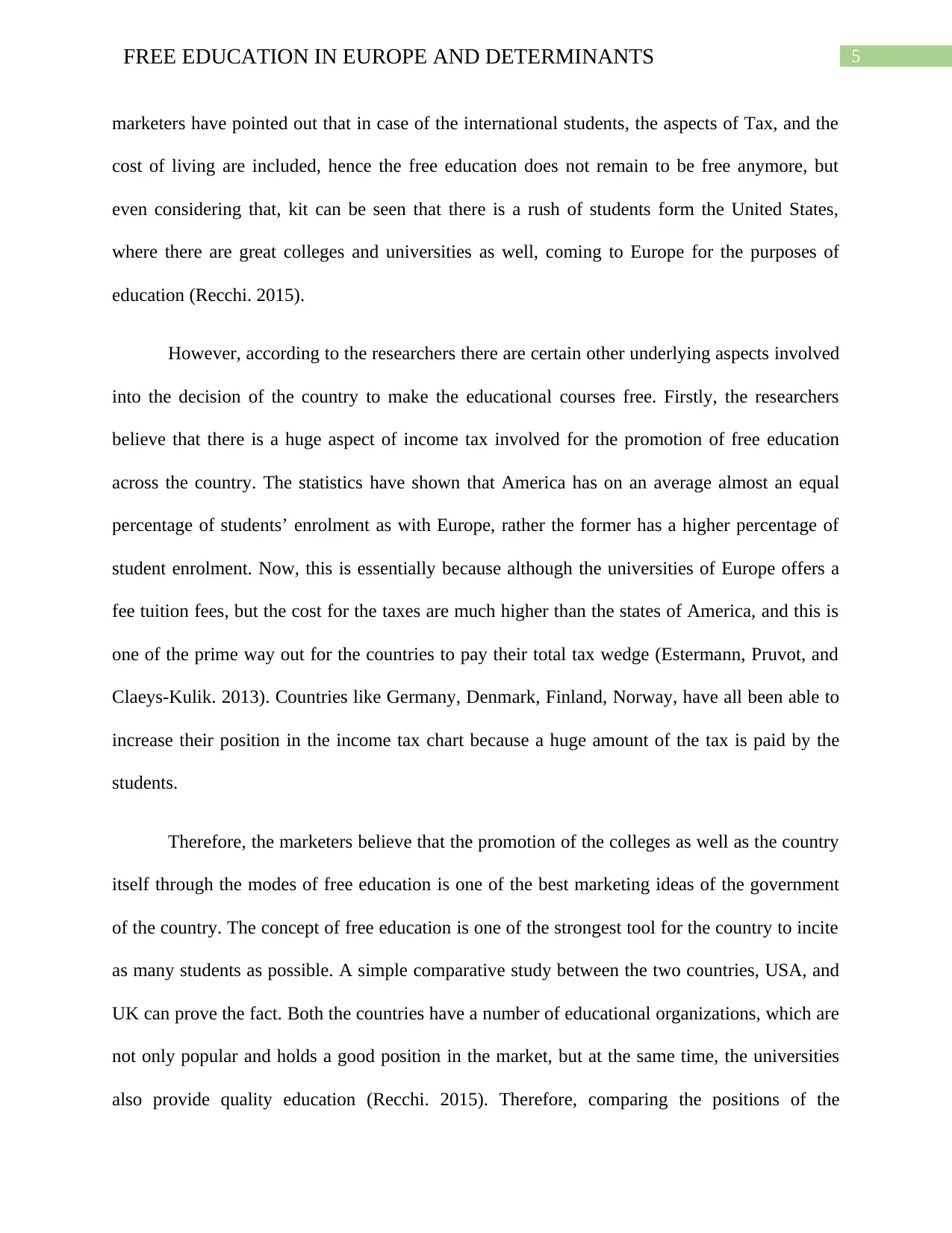
5FREE EDUCATION IN EUROPE AND DETERMINANTS
marketers have pointed out that in case of the international students, the aspects of Tax, and the
cost of living are included, hence the free education does not remain to be free anymore, but
even considering that, kit can be seen that there is a rush of students form the United States,
where there are great colleges and universities as well, coming to Europe for the purposes of
education (Recchi. 2015).
However, according to the researchers there are certain other underlying aspects involved
into the decision of the country to make the educational courses free. Firstly, the researchers
believe that there is a huge aspect of income tax involved for the promotion of free education
across the country. The statistics have shown that America has on an average almost an equal
percentage of students’ enrolment as with Europe, rather the former has a higher percentage of
student enrolment. Now, this is essentially because although the universities of Europe offers a
fee tuition fees, but the cost for the taxes are much higher than the states of America, and this is
one of the prime way out for the countries to pay their total tax wedge (Estermann, Pruvot, and
Claeys-Kulik. 2013). Countries like Germany, Denmark, Finland, Norway, have all been able to
increase their position in the income tax chart because a huge amount of the tax is paid by the
students.
Therefore, the marketers believe that the promotion of the colleges as well as the country
itself through the modes of free education is one of the best marketing ideas of the government
of the country. The concept of free education is one of the strongest tool for the country to incite
as many students as possible. A simple comparative study between the two countries, USA, and
UK can prove the fact. Both the countries have a number of educational organizations, which are
not only popular and holds a good position in the market, but at the same time, the universities
also provide quality education (Recchi. 2015). Therefore, comparing the positions of the
marketers have pointed out that in case of the international students, the aspects of Tax, and the
cost of living are included, hence the free education does not remain to be free anymore, but
even considering that, kit can be seen that there is a rush of students form the United States,
where there are great colleges and universities as well, coming to Europe for the purposes of
education (Recchi. 2015).
However, according to the researchers there are certain other underlying aspects involved
into the decision of the country to make the educational courses free. Firstly, the researchers
believe that there is a huge aspect of income tax involved for the promotion of free education
across the country. The statistics have shown that America has on an average almost an equal
percentage of students’ enrolment as with Europe, rather the former has a higher percentage of
student enrolment. Now, this is essentially because although the universities of Europe offers a
fee tuition fees, but the cost for the taxes are much higher than the states of America, and this is
one of the prime way out for the countries to pay their total tax wedge (Estermann, Pruvot, and
Claeys-Kulik. 2013). Countries like Germany, Denmark, Finland, Norway, have all been able to
increase their position in the income tax chart because a huge amount of the tax is paid by the
students.
Therefore, the marketers believe that the promotion of the colleges as well as the country
itself through the modes of free education is one of the best marketing ideas of the government
of the country. The concept of free education is one of the strongest tool for the country to incite
as many students as possible. A simple comparative study between the two countries, USA, and
UK can prove the fact. Both the countries have a number of educational organizations, which are
not only popular and holds a good position in the market, but at the same time, the universities
also provide quality education (Recchi. 2015). Therefore, comparing the positions of the
⊘ This is a preview!⊘
Do you want full access?
Subscribe today to unlock all pages.

Trusted by 1+ million students worldwide
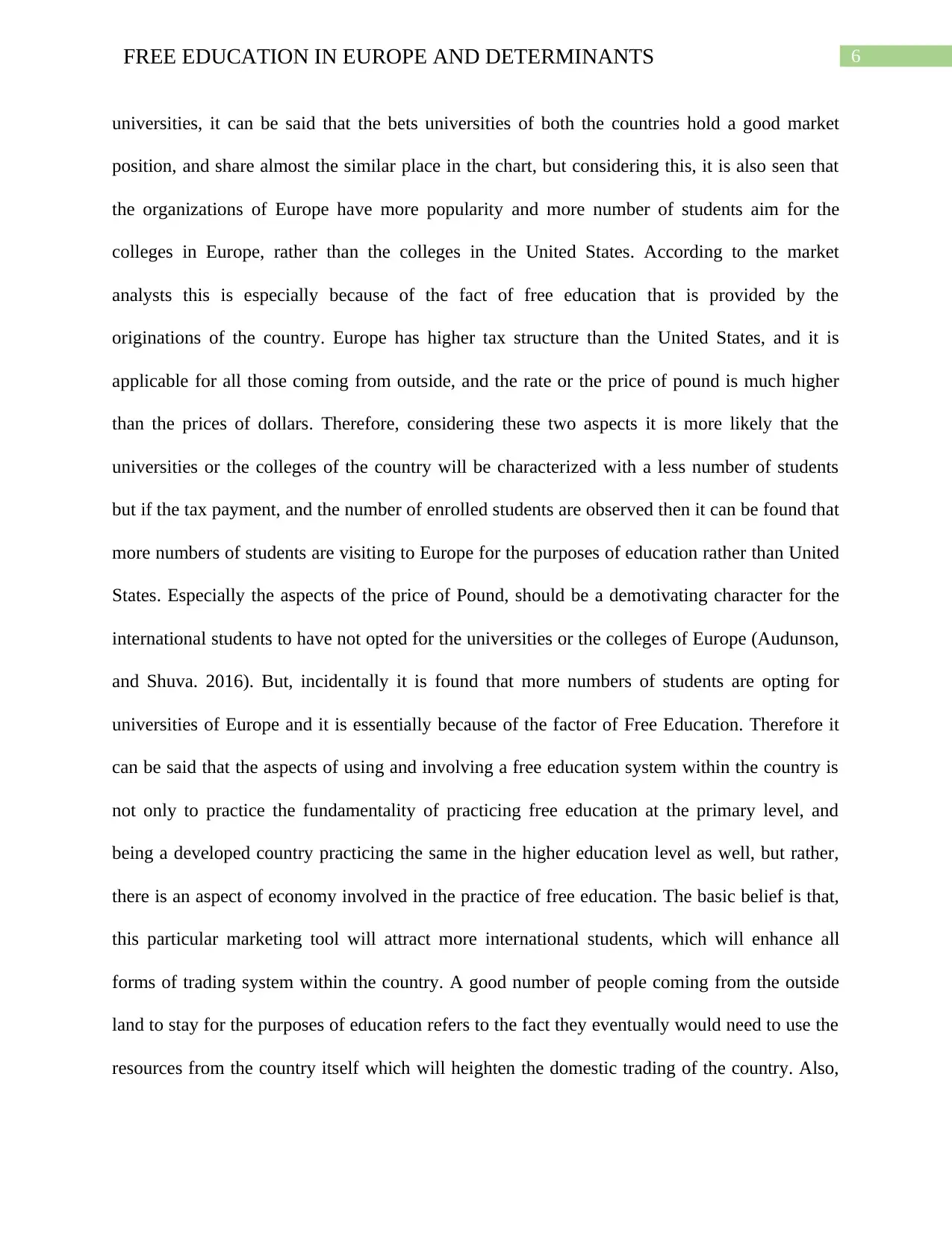
6FREE EDUCATION IN EUROPE AND DETERMINANTS
universities, it can be said that the bets universities of both the countries hold a good market
position, and share almost the similar place in the chart, but considering this, it is also seen that
the organizations of Europe have more popularity and more number of students aim for the
colleges in Europe, rather than the colleges in the United States. According to the market
analysts this is especially because of the fact of free education that is provided by the
originations of the country. Europe has higher tax structure than the United States, and it is
applicable for all those coming from outside, and the rate or the price of pound is much higher
than the prices of dollars. Therefore, considering these two aspects it is more likely that the
universities or the colleges of the country will be characterized with a less number of students
but if the tax payment, and the number of enrolled students are observed then it can be found that
more numbers of students are visiting to Europe for the purposes of education rather than United
States. Especially the aspects of the price of Pound, should be a demotivating character for the
international students to have not opted for the universities or the colleges of Europe (Audunson,
and Shuva. 2016). But, incidentally it is found that more numbers of students are opting for
universities of Europe and it is essentially because of the factor of Free Education. Therefore it
can be said that the aspects of using and involving a free education system within the country is
not only to practice the fundamentality of practicing free education at the primary level, and
being a developed country practicing the same in the higher education level as well, but rather,
there is an aspect of economy involved in the practice of free education. The basic belief is that,
this particular marketing tool will attract more international students, which will enhance all
forms of trading system within the country. A good number of people coming from the outside
land to stay for the purposes of education refers to the fact they eventually would need to use the
resources from the country itself which will heighten the domestic trading of the country. Also,
universities, it can be said that the bets universities of both the countries hold a good market
position, and share almost the similar place in the chart, but considering this, it is also seen that
the organizations of Europe have more popularity and more number of students aim for the
colleges in Europe, rather than the colleges in the United States. According to the market
analysts this is especially because of the fact of free education that is provided by the
originations of the country. Europe has higher tax structure than the United States, and it is
applicable for all those coming from outside, and the rate or the price of pound is much higher
than the prices of dollars. Therefore, considering these two aspects it is more likely that the
universities or the colleges of the country will be characterized with a less number of students
but if the tax payment, and the number of enrolled students are observed then it can be found that
more numbers of students are visiting to Europe for the purposes of education rather than United
States. Especially the aspects of the price of Pound, should be a demotivating character for the
international students to have not opted for the universities or the colleges of Europe (Audunson,
and Shuva. 2016). But, incidentally it is found that more numbers of students are opting for
universities of Europe and it is essentially because of the factor of Free Education. Therefore it
can be said that the aspects of using and involving a free education system within the country is
not only to practice the fundamentality of practicing free education at the primary level, and
being a developed country practicing the same in the higher education level as well, but rather,
there is an aspect of economy involved in the practice of free education. The basic belief is that,
this particular marketing tool will attract more international students, which will enhance all
forms of trading system within the country. A good number of people coming from the outside
land to stay for the purposes of education refers to the fact they eventually would need to use the
resources from the country itself which will heighten the domestic trading of the country. Also,
Paraphrase This Document
Need a fresh take? Get an instant paraphrase of this document with our AI Paraphraser
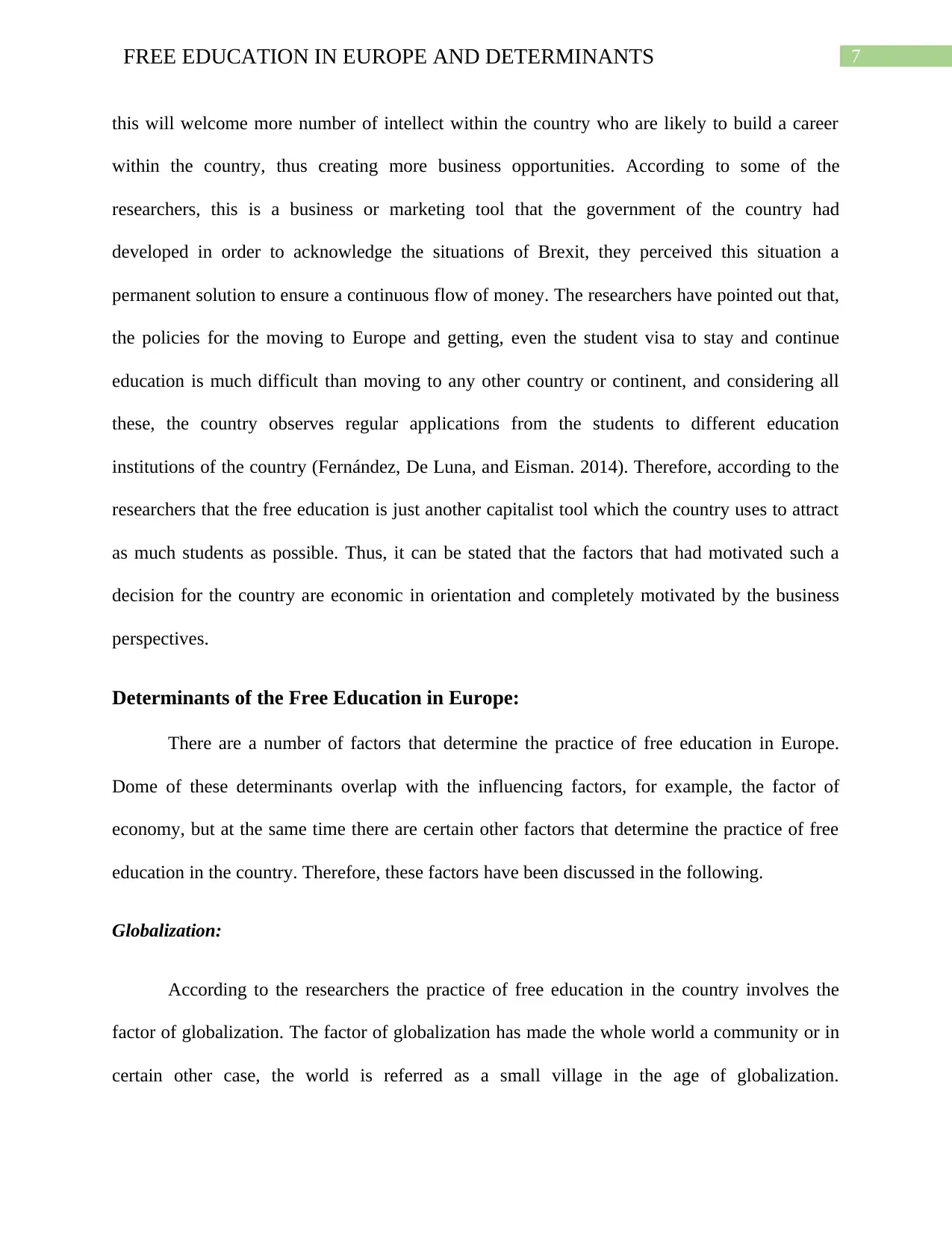
7FREE EDUCATION IN EUROPE AND DETERMINANTS
this will welcome more number of intellect within the country who are likely to build a career
within the country, thus creating more business opportunities. According to some of the
researchers, this is a business or marketing tool that the government of the country had
developed in order to acknowledge the situations of Brexit, they perceived this situation a
permanent solution to ensure a continuous flow of money. The researchers have pointed out that,
the policies for the moving to Europe and getting, even the student visa to stay and continue
education is much difficult than moving to any other country or continent, and considering all
these, the country observes regular applications from the students to different education
institutions of the country (Fernández, De Luna, and Eisman. 2014). Therefore, according to the
researchers that the free education is just another capitalist tool which the country uses to attract
as much students as possible. Thus, it can be stated that the factors that had motivated such a
decision for the country are economic in orientation and completely motivated by the business
perspectives.
Determinants of the Free Education in Europe:
There are a number of factors that determine the practice of free education in Europe.
Dome of these determinants overlap with the influencing factors, for example, the factor of
economy, but at the same time there are certain other factors that determine the practice of free
education in the country. Therefore, these factors have been discussed in the following.
Globalization:
According to the researchers the practice of free education in the country involves the
factor of globalization. The factor of globalization has made the whole world a community or in
certain other case, the world is referred as a small village in the age of globalization.
this will welcome more number of intellect within the country who are likely to build a career
within the country, thus creating more business opportunities. According to some of the
researchers, this is a business or marketing tool that the government of the country had
developed in order to acknowledge the situations of Brexit, they perceived this situation a
permanent solution to ensure a continuous flow of money. The researchers have pointed out that,
the policies for the moving to Europe and getting, even the student visa to stay and continue
education is much difficult than moving to any other country or continent, and considering all
these, the country observes regular applications from the students to different education
institutions of the country (Fernández, De Luna, and Eisman. 2014). Therefore, according to the
researchers that the free education is just another capitalist tool which the country uses to attract
as much students as possible. Thus, it can be stated that the factors that had motivated such a
decision for the country are economic in orientation and completely motivated by the business
perspectives.
Determinants of the Free Education in Europe:
There are a number of factors that determine the practice of free education in Europe.
Dome of these determinants overlap with the influencing factors, for example, the factor of
economy, but at the same time there are certain other factors that determine the practice of free
education in the country. Therefore, these factors have been discussed in the following.
Globalization:
According to the researchers the practice of free education in the country involves the
factor of globalization. The factor of globalization has made the whole world a community or in
certain other case, the world is referred as a small village in the age of globalization.
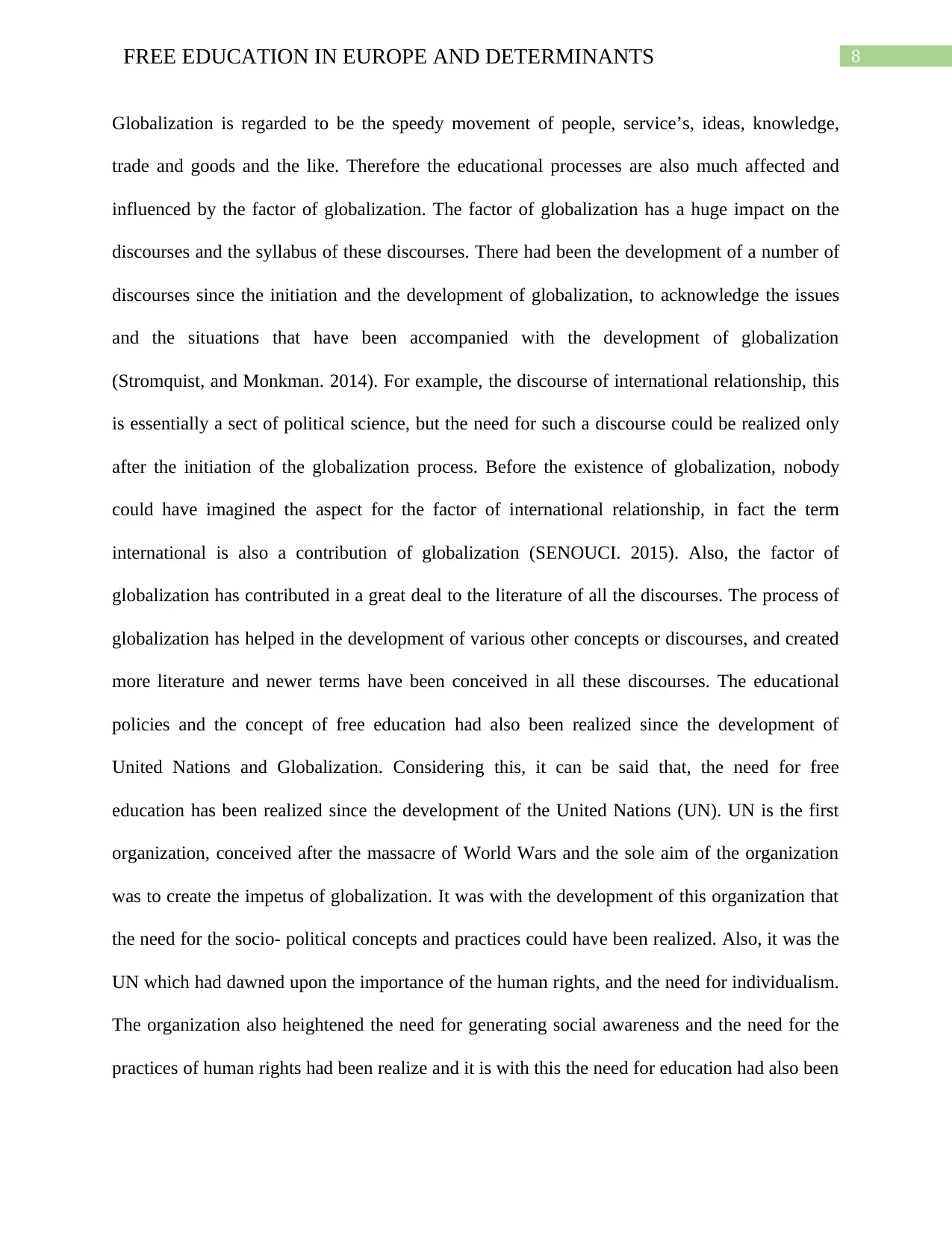
8FREE EDUCATION IN EUROPE AND DETERMINANTS
Globalization is regarded to be the speedy movement of people, service’s, ideas, knowledge,
trade and goods and the like. Therefore the educational processes are also much affected and
influenced by the factor of globalization. The factor of globalization has a huge impact on the
discourses and the syllabus of these discourses. There had been the development of a number of
discourses since the initiation and the development of globalization, to acknowledge the issues
and the situations that have been accompanied with the development of globalization
(Stromquist, and Monkman. 2014). For example, the discourse of international relationship, this
is essentially a sect of political science, but the need for such a discourse could be realized only
after the initiation of the globalization process. Before the existence of globalization, nobody
could have imagined the aspect for the factor of international relationship, in fact the term
international is also a contribution of globalization (SENOUCI. 2015). Also, the factor of
globalization has contributed in a great deal to the literature of all the discourses. The process of
globalization has helped in the development of various other concepts or discourses, and created
more literature and newer terms have been conceived in all these discourses. The educational
policies and the concept of free education had also been realized since the development of
United Nations and Globalization. Considering this, it can be said that, the need for free
education has been realized since the development of the United Nations (UN). UN is the first
organization, conceived after the massacre of World Wars and the sole aim of the organization
was to create the impetus of globalization. It was with the development of this organization that
the need for the socio- political concepts and practices could have been realized. Also, it was the
UN which had dawned upon the importance of the human rights, and the need for individualism.
The organization also heightened the need for generating social awareness and the need for the
practices of human rights had been realize and it is with this the need for education had also been
Globalization is regarded to be the speedy movement of people, service’s, ideas, knowledge,
trade and goods and the like. Therefore the educational processes are also much affected and
influenced by the factor of globalization. The factor of globalization has a huge impact on the
discourses and the syllabus of these discourses. There had been the development of a number of
discourses since the initiation and the development of globalization, to acknowledge the issues
and the situations that have been accompanied with the development of globalization
(Stromquist, and Monkman. 2014). For example, the discourse of international relationship, this
is essentially a sect of political science, but the need for such a discourse could be realized only
after the initiation of the globalization process. Before the existence of globalization, nobody
could have imagined the aspect for the factor of international relationship, in fact the term
international is also a contribution of globalization (SENOUCI. 2015). Also, the factor of
globalization has contributed in a great deal to the literature of all the discourses. The process of
globalization has helped in the development of various other concepts or discourses, and created
more literature and newer terms have been conceived in all these discourses. The educational
policies and the concept of free education had also been realized since the development of
United Nations and Globalization. Considering this, it can be said that, the need for free
education has been realized since the development of the United Nations (UN). UN is the first
organization, conceived after the massacre of World Wars and the sole aim of the organization
was to create the impetus of globalization. It was with the development of this organization that
the need for the socio- political concepts and practices could have been realized. Also, it was the
UN which had dawned upon the importance of the human rights, and the need for individualism.
The organization also heightened the need for generating social awareness and the need for the
practices of human rights had been realize and it is with this the need for education had also been
⊘ This is a preview!⊘
Do you want full access?
Subscribe today to unlock all pages.

Trusted by 1+ million students worldwide
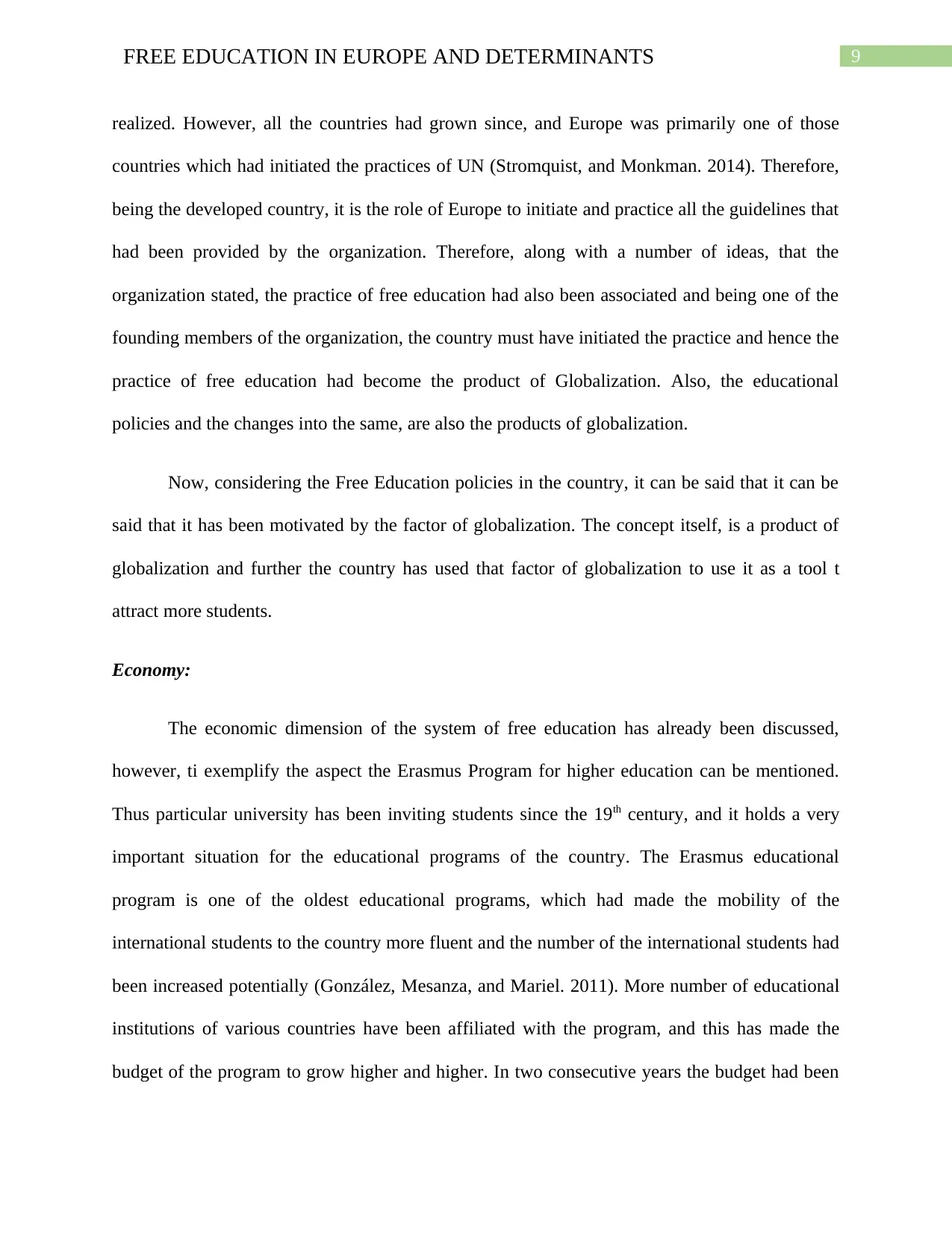
9FREE EDUCATION IN EUROPE AND DETERMINANTS
realized. However, all the countries had grown since, and Europe was primarily one of those
countries which had initiated the practices of UN (Stromquist, and Monkman. 2014). Therefore,
being the developed country, it is the role of Europe to initiate and practice all the guidelines that
had been provided by the organization. Therefore, along with a number of ideas, that the
organization stated, the practice of free education had also been associated and being one of the
founding members of the organization, the country must have initiated the practice and hence the
practice of free education had become the product of Globalization. Also, the educational
policies and the changes into the same, are also the products of globalization.
Now, considering the Free Education policies in the country, it can be said that it can be
said that it has been motivated by the factor of globalization. The concept itself, is a product of
globalization and further the country has used that factor of globalization to use it as a tool t
attract more students.
Economy:
The economic dimension of the system of free education has already been discussed,
however, ti exemplify the aspect the Erasmus Program for higher education can be mentioned.
Thus particular university has been inviting students since the 19th century, and it holds a very
important situation for the educational programs of the country. The Erasmus educational
program is one of the oldest educational programs, which had made the mobility of the
international students to the country more fluent and the number of the international students had
been increased potentially (González, Mesanza, and Mariel. 2011). More number of educational
institutions of various countries have been affiliated with the program, and this has made the
budget of the program to grow higher and higher. In two consecutive years the budget had been
realized. However, all the countries had grown since, and Europe was primarily one of those
countries which had initiated the practices of UN (Stromquist, and Monkman. 2014). Therefore,
being the developed country, it is the role of Europe to initiate and practice all the guidelines that
had been provided by the organization. Therefore, along with a number of ideas, that the
organization stated, the practice of free education had also been associated and being one of the
founding members of the organization, the country must have initiated the practice and hence the
practice of free education had become the product of Globalization. Also, the educational
policies and the changes into the same, are also the products of globalization.
Now, considering the Free Education policies in the country, it can be said that it can be
said that it has been motivated by the factor of globalization. The concept itself, is a product of
globalization and further the country has used that factor of globalization to use it as a tool t
attract more students.
Economy:
The economic dimension of the system of free education has already been discussed,
however, ti exemplify the aspect the Erasmus Program for higher education can be mentioned.
Thus particular university has been inviting students since the 19th century, and it holds a very
important situation for the educational programs of the country. The Erasmus educational
program is one of the oldest educational programs, which had made the mobility of the
international students to the country more fluent and the number of the international students had
been increased potentially (González, Mesanza, and Mariel. 2011). More number of educational
institutions of various countries have been affiliated with the program, and this has made the
budget of the program to grow higher and higher. In two consecutive years the budget had been
Paraphrase This Document
Need a fresh take? Get an instant paraphrase of this document with our AI Paraphraser
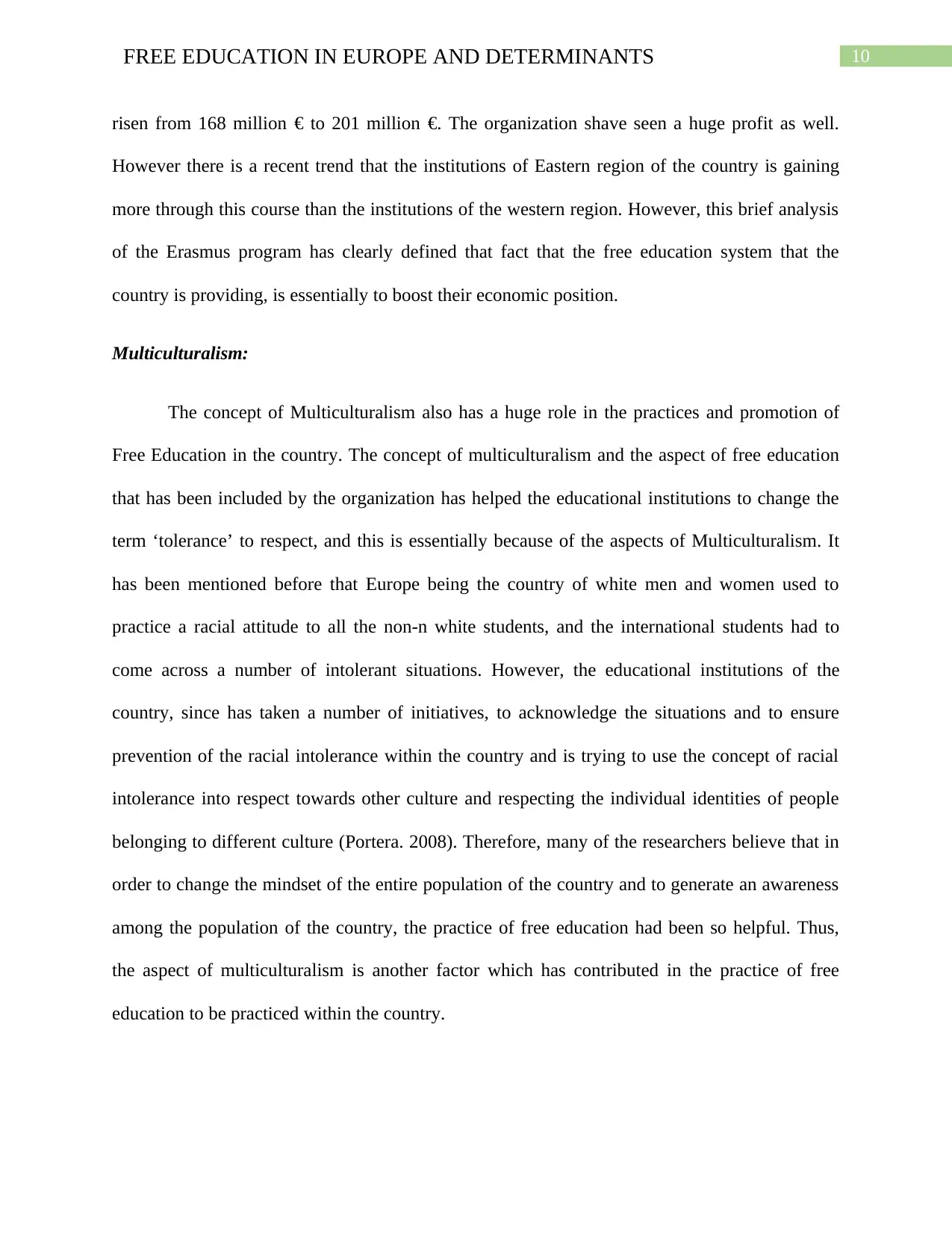
10FREE EDUCATION IN EUROPE AND DETERMINANTS
risen from 168 million € to 201 million €. The organization shave seen a huge profit as well.
However there is a recent trend that the institutions of Eastern region of the country is gaining
more through this course than the institutions of the western region. However, this brief analysis
of the Erasmus program has clearly defined that fact that the free education system that the
country is providing, is essentially to boost their economic position.
Multiculturalism:
The concept of Multiculturalism also has a huge role in the practices and promotion of
Free Education in the country. The concept of multiculturalism and the aspect of free education
that has been included by the organization has helped the educational institutions to change the
term ‘tolerance’ to respect, and this is essentially because of the aspects of Multiculturalism. It
has been mentioned before that Europe being the country of white men and women used to
practice a racial attitude to all the non-n white students, and the international students had to
come across a number of intolerant situations. However, the educational institutions of the
country, since has taken a number of initiatives, to acknowledge the situations and to ensure
prevention of the racial intolerance within the country and is trying to use the concept of racial
intolerance into respect towards other culture and respecting the individual identities of people
belonging to different culture (Portera. 2008). Therefore, many of the researchers believe that in
order to change the mindset of the entire population of the country and to generate an awareness
among the population of the country, the practice of free education had been so helpful. Thus,
the aspect of multiculturalism is another factor which has contributed in the practice of free
education to be practiced within the country.
risen from 168 million € to 201 million €. The organization shave seen a huge profit as well.
However there is a recent trend that the institutions of Eastern region of the country is gaining
more through this course than the institutions of the western region. However, this brief analysis
of the Erasmus program has clearly defined that fact that the free education system that the
country is providing, is essentially to boost their economic position.
Multiculturalism:
The concept of Multiculturalism also has a huge role in the practices and promotion of
Free Education in the country. The concept of multiculturalism and the aspect of free education
that has been included by the organization has helped the educational institutions to change the
term ‘tolerance’ to respect, and this is essentially because of the aspects of Multiculturalism. It
has been mentioned before that Europe being the country of white men and women used to
practice a racial attitude to all the non-n white students, and the international students had to
come across a number of intolerant situations. However, the educational institutions of the
country, since has taken a number of initiatives, to acknowledge the situations and to ensure
prevention of the racial intolerance within the country and is trying to use the concept of racial
intolerance into respect towards other culture and respecting the individual identities of people
belonging to different culture (Portera. 2008). Therefore, many of the researchers believe that in
order to change the mindset of the entire population of the country and to generate an awareness
among the population of the country, the practice of free education had been so helpful. Thus,
the aspect of multiculturalism is another factor which has contributed in the practice of free
education to be practiced within the country.
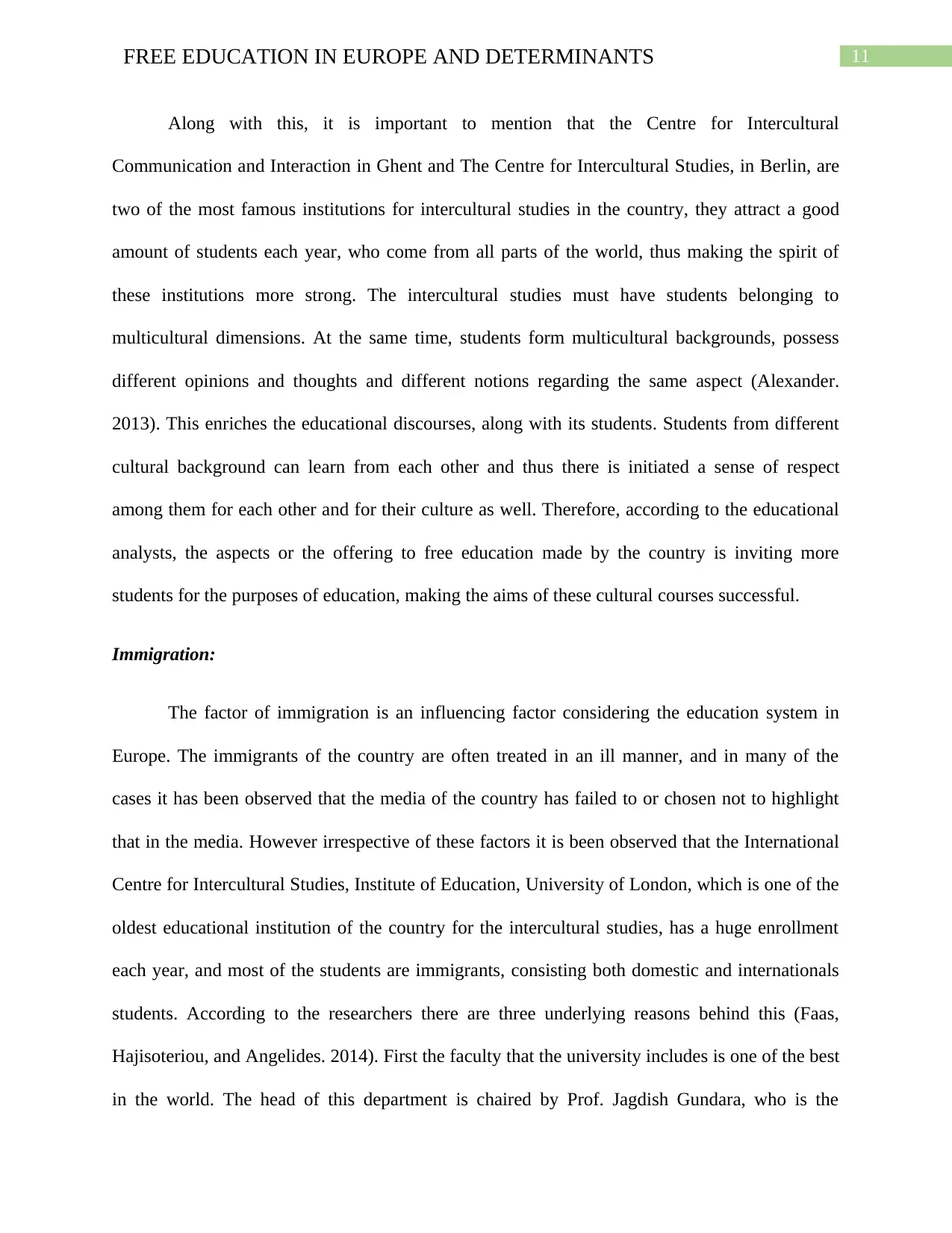
11FREE EDUCATION IN EUROPE AND DETERMINANTS
Along with this, it is important to mention that the Centre for Intercultural
Communication and Interaction in Ghent and The Centre for Intercultural Studies, in Berlin, are
two of the most famous institutions for intercultural studies in the country, they attract a good
amount of students each year, who come from all parts of the world, thus making the spirit of
these institutions more strong. The intercultural studies must have students belonging to
multicultural dimensions. At the same time, students form multicultural backgrounds, possess
different opinions and thoughts and different notions regarding the same aspect (Alexander.
2013). This enriches the educational discourses, along with its students. Students from different
cultural background can learn from each other and thus there is initiated a sense of respect
among them for each other and for their culture as well. Therefore, according to the educational
analysts, the aspects or the offering to free education made by the country is inviting more
students for the purposes of education, making the aims of these cultural courses successful.
Immigration:
The factor of immigration is an influencing factor considering the education system in
Europe. The immigrants of the country are often treated in an ill manner, and in many of the
cases it has been observed that the media of the country has failed to or chosen not to highlight
that in the media. However irrespective of these factors it is been observed that the International
Centre for Intercultural Studies, Institute of Education, University of London, which is one of the
oldest educational institution of the country for the intercultural studies, has a huge enrollment
each year, and most of the students are immigrants, consisting both domestic and internationals
students. According to the researchers there are three underlying reasons behind this (Faas,
Hajisoteriou, and Angelides. 2014). First the faculty that the university includes is one of the best
in the world. The head of this department is chaired by Prof. Jagdish Gundara, who is the
Along with this, it is important to mention that the Centre for Intercultural
Communication and Interaction in Ghent and The Centre for Intercultural Studies, in Berlin, are
two of the most famous institutions for intercultural studies in the country, they attract a good
amount of students each year, who come from all parts of the world, thus making the spirit of
these institutions more strong. The intercultural studies must have students belonging to
multicultural dimensions. At the same time, students form multicultural backgrounds, possess
different opinions and thoughts and different notions regarding the same aspect (Alexander.
2013). This enriches the educational discourses, along with its students. Students from different
cultural background can learn from each other and thus there is initiated a sense of respect
among them for each other and for their culture as well. Therefore, according to the educational
analysts, the aspects or the offering to free education made by the country is inviting more
students for the purposes of education, making the aims of these cultural courses successful.
Immigration:
The factor of immigration is an influencing factor considering the education system in
Europe. The immigrants of the country are often treated in an ill manner, and in many of the
cases it has been observed that the media of the country has failed to or chosen not to highlight
that in the media. However irrespective of these factors it is been observed that the International
Centre for Intercultural Studies, Institute of Education, University of London, which is one of the
oldest educational institution of the country for the intercultural studies, has a huge enrollment
each year, and most of the students are immigrants, consisting both domestic and internationals
students. According to the researchers there are three underlying reasons behind this (Faas,
Hajisoteriou, and Angelides. 2014). First the faculty that the university includes is one of the best
in the world. The head of this department is chaired by Prof. Jagdish Gundara, who is the
⊘ This is a preview!⊘
Do you want full access?
Subscribe today to unlock all pages.

Trusted by 1+ million students worldwide
1 out of 20
Related Documents
Your All-in-One AI-Powered Toolkit for Academic Success.
+13062052269
info@desklib.com
Available 24*7 on WhatsApp / Email
![[object Object]](/_next/static/media/star-bottom.7253800d.svg)
Unlock your academic potential
Copyright © 2020–2026 A2Z Services. All Rights Reserved. Developed and managed by ZUCOL.





